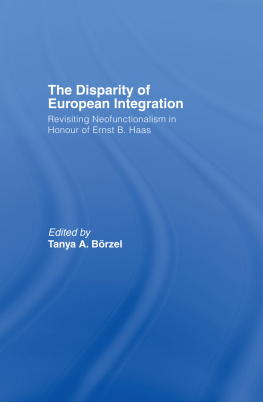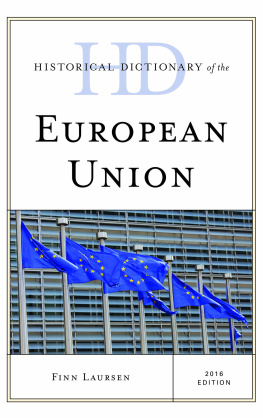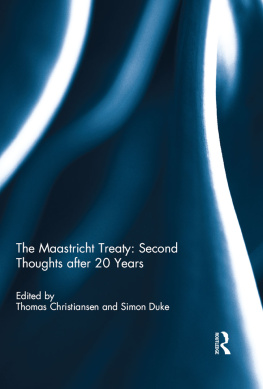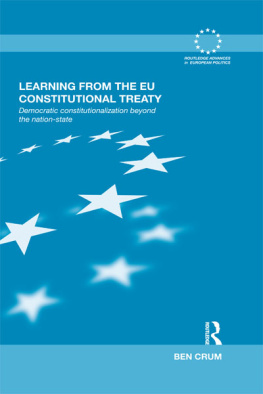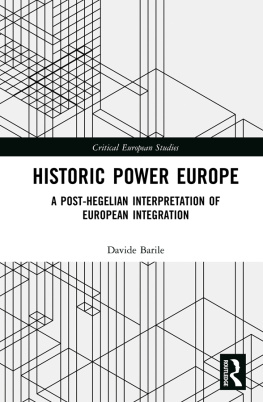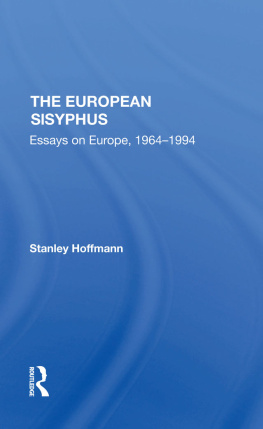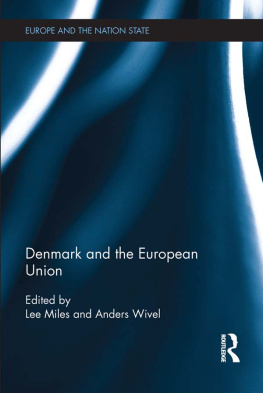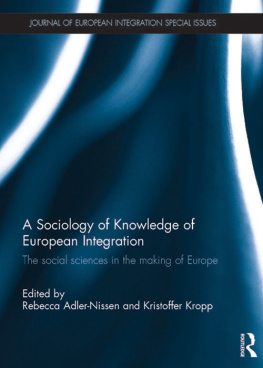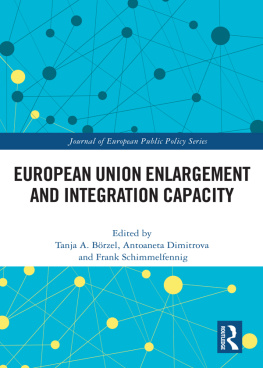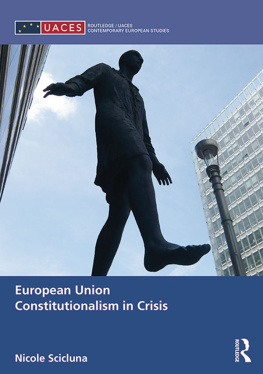The Disparity of European Integration
This new study revisits the work of the late Ernst Haas, assessing his relevance for contemporary European integration and its disparities.
With his seminal book, The Uniting of Europe Haas laid the foundations for one of the most prominent paradigms of European integration neofunctionalism. He engaged in inductive reasoning to theorize the dynamics of the European integration process that led from the Treaty of Paris in 1951 to the Treaty of Rome in 1957. The Treaty of Rome set the constitutional framework for a Common Market.
Today, a second Treaty of Rome may lay the foundation for a European Constitution that embeds the Common Market in a European polity. Unfortunately, Haas will not be able to witness this path-breaking step in the development of a European political community, which he so aptly theorized almost five decades ago. This is all the more regrettable since students of European integration are more than ever challenged to tackle a major empirical puzzle: After 50 years of European integration, the member states managed to adopt a single currency and to develop common policies and institutions on justice and home affairs. The integration of foreign policy and defence, by contrast, is still lagging behind. This text delivers sharp insights into these issues.
This book, previously published as a special issue of the Journal of European Public Policy, will be of great interest to all students and scholars of international relations, the European Union, European politics and Public Policy.
Tanja A. Brzel is professor of European Integration at the Otto Suhr Institute for Political Science, Free University of Berlin, Germany.
Journal of European Public Policy Series
Series Editor: Jeremy Richardson is a Professor at Nuffield College,
Oxford University
This series seeks to bring together some of the finest edited works on European Public Policy. Reprinting from Special Issues of the Journal of European Public Policy, the focus is on using a wide range of social sciences approaches, both qualitative and quantitative, to gain a comprehensive and definitive understanding of Public Policy in Europe.
Towards a Federal Europe
Edited by Alexander H. Trechsel
The Disparity of European Integration
Edited by Tanja A. Brzel
The Disparity of European Integration
Revisiting Neofunctionalism in Honour of Ernst B. Haas
Edited by Tanya A. Brzel
First published 2006 by Routledge
2 Park Square, Milton Park, Abingdon, Oxon, OX14 4RN
Simultaneously published in the USA and Canada
by Routledge
270 Madison Ave, New York, NY 10016.
Routledge is an imprint of the Taylor & Francis Group
2006 Taylor & Francis
All rights reserved. No part of this book may be reprinted or reproduced or utilised in any form or by any electronic, mechanical, or other means, now known or hereafter invented, including photocopying and recording, or in any information storage or retrieval system, without permission in writing from the publishers.
British Library Cataloguing in Publication Data
A catalogue record for this book is available from the British Library
Library of Congress Cataloging in Publication Data
A catalog record for this title has been requested
ISBN10: 0-415-37490-1 (Cased)
ISBN13: 978-0-415-37490-3 (Cased)
In March 2003, Ernst B. Haas passed away. This special issue seeks to pay tribute to one of the greatest thinkers in European integration studies. The idea was born at the American Political Science Convention of 2003, where Peter Katzenstein, Bob Keohane, John Ruggie, and Philippe Schmitter organized a roundtable in honour of Ernst Haas. The four did a wonderful job in accounting for Haass intellectual contributions to political science. This is particularly true for his work outside the area of regional integration that many of us are less familiar with (cf. Ruggie et al. 2005). Without denying the importance of his studies of change at the level of the world polity or of nationalism, Haas will be mostly remembered as the founding father of neofunctionalist theorizing on European integration. Neofunctionalism still inspires countless students in writing their seminar papers, master theses, and Ph.D. dissertations. Given his immense importance to European Union studies, it only seemed logical to organize something like the APSA roundtable, inviting students of European integration with different intellectual backgrounds to reflect on the theoretical works of Ernst Haas and explore whether his neofunctionalist reasoning can still help us to understand and explain core developments of European integration. Most of the contributors to the special issue had attended the APSA roundtable and immediately subscribed to the idea. I approached Jeremy Richardson, who greeted the suggestion with great enthusiasm and offered a publication spot within less than two years! Thanks to the contributors, who dutifully complied with the strict deadlines imposed on them, thanks to the heroic work of the anonymous reviewer who extensively commented on all eight papers in less than a week (!), and thanks to the professional support of Jeremy Richardson and the JEPP team, we were able to meet the publication schedule. I am particularly indebted to Diana Panke and Tina Freyburg for their assistance, which made editing this special issue almost a piece of cake.
Tanja A. Brzel
Reference
Ruggie, J.G., Katzenstein, P.J., Keohane, R.O. and Schmitter, P.C. (2005) Transformations in world politics: the intellectual contributions of Ernst B. Haas, Annual Review of Political Science 8 (forthcoming).
Tanja A. Brzel
Goods can be integrated and maximized, so to speak, anonymously; the integration of foreign and military policies, in a world in which security and leadership are the scarcest of values, means what it has always meant: the acceptance by some of the predominance of others.
(Hoffmann 1964: 1275)
Introduction
Forty-five years ago, in his seminal book The Uniting of Europe, Ernst Haas laid the foundations for one of the most, if not the most, prominent paradigms of European integration neofunctionalism. The book engaged in inductive reasoning to theorize the dynamics of the European integration process that led from the Treaty of Paris in 1951 to the Treaty of Rome in 1957.
The Treaty of Rome set the constitutional framework for a Common Market. Today, a second Treaty of Rome may lay the foundation for a European Constitution that embeds the Common Market in a European polity. Unfortunately, Ernst Haas will not be able to witness this path-breaking step in the development of a European political community, which he so aptly theorized almost five decades ago. This is all the more regrettable since students of European integration are more than ever challenged to tackle a major empirical puzzle: on the one hand, the acquis communautaire represents a unique degree of political integration beyond the nation state. The Common Market has been crowned with a common currency and consumers have been made citizens with their own fundamental rights and freedoms enshrined in a European citizenship and a Charter of Fundamental Rights. On the other hand, political integration in some sectors has seriously lagged behind. The Maastricht Treaty extended European integration to the last two bastions of national sovereignty: foreign and security policy and justice and home affairs. But the member states created a completely new set of institutions (second and third pillars) to keep the sectors off-limits to the Commission, the European Court of Justice (ECJ) and the European Parliament (EP). While the Amsterdam Treaty moved parts of the third pillar into the first pillar, the common foreign and security policy (CFSP) has remained under the exclusive control of the member states. Other examples of disparate integration are social welfare, culture and education policy, and economic governance. The European Union (EU) still lacks any substantial competencies in these areas. If the member states decide to co-ordinate their activities, they do so often outside the Community framework.

